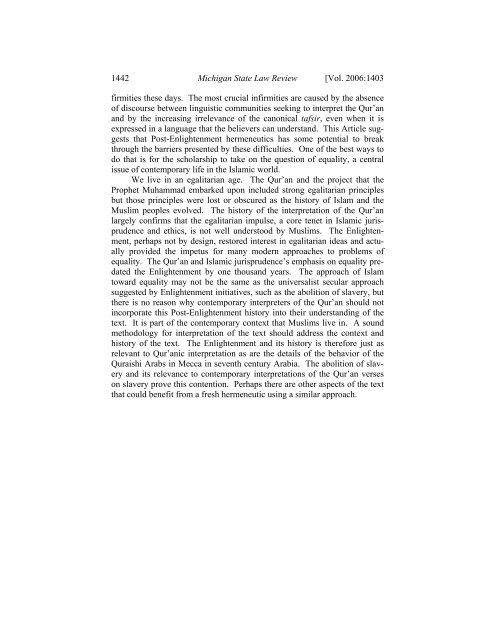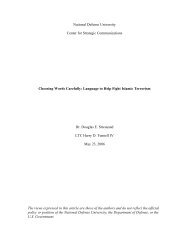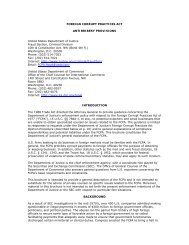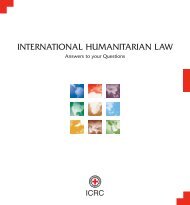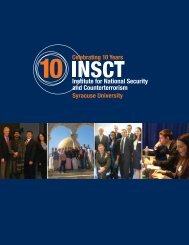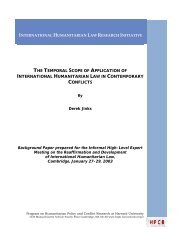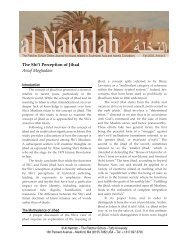some reflection on post-enlightenment qur'anic hermeneutics
some reflection on post-enlightenment qur'anic hermeneutics
some reflection on post-enlightenment qur'anic hermeneutics
You also want an ePaper? Increase the reach of your titles
YUMPU automatically turns print PDFs into web optimized ePapers that Google loves.
1442 Michigan State Law Review [Vol. 2006:1403firmities these days. The most crucial infirmities are caused by the absenceof discourse between linguistic communities seeking to interpret the Qur’anand by the increasing irrelevance of the can<strong>on</strong>ical tafsir, even when it isexpressed in a language that the believers can understand. This Article suggeststhat Post-Enlightenment <strong>hermeneutics</strong> has <str<strong>on</strong>g>some</str<strong>on</strong>g> potential to breakthrough the barriers presented by these difficulties. One of the best ways todo that is for the scholarship to take <strong>on</strong> the questi<strong>on</strong> of equality, a centralissue of c<strong>on</strong>temporary life in the Islamic world.We live in an egalitarian age. The Qur’an and the project that theProphet Muhammad embarked up<strong>on</strong> included str<strong>on</strong>g egalitarian principlesbut those principles were lost or obscured as the history of Islam and theMuslim peoples evolved. The history of the interpretati<strong>on</strong> of the Qur’anlargely c<strong>on</strong>firms that the egalitarian impulse, a core tenet in Islamic jurisprudenceand ethics, is not well understood by Muslims. The Enlightenment,perhaps not by design, restored interest in egalitarian ideas and actuallyprovided the impetus for many modern approaches to problems ofequality. The Qur’an and Islamic jurisprudence’s emphasis <strong>on</strong> equality predatedthe Enlightenment by <strong>on</strong>e thousand years. The approach of Islamtoward equality may not be the same as the universalist secular approachsuggested by Enlightenment initiatives, such as the aboliti<strong>on</strong> of slavery, butthere is no reas<strong>on</strong> why c<strong>on</strong>temporary interpreters of the Qur’an should notincorporate this Post-Enlightenment history into their understanding of thetext. It is part of the c<strong>on</strong>temporary c<strong>on</strong>text that Muslims live in. A soundmethodology for interpretati<strong>on</strong> of the text should address the c<strong>on</strong>text andhistory of the text. The Enlightenment and its history is therefore just asrelevant to Qur’anic interpretati<strong>on</strong> as are the details of the behavior of theQuraishi Arabs in Mecca in seventh century Arabia. The aboliti<strong>on</strong> of slaveryand its relevance to c<strong>on</strong>temporary interpretati<strong>on</strong>s of the Qur’an verses<strong>on</strong> slavery prove this c<strong>on</strong>tenti<strong>on</strong>. Perhaps there are other aspects of the textthat could benefit from a fresh hermeneutic using a similar approach.


